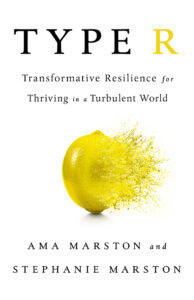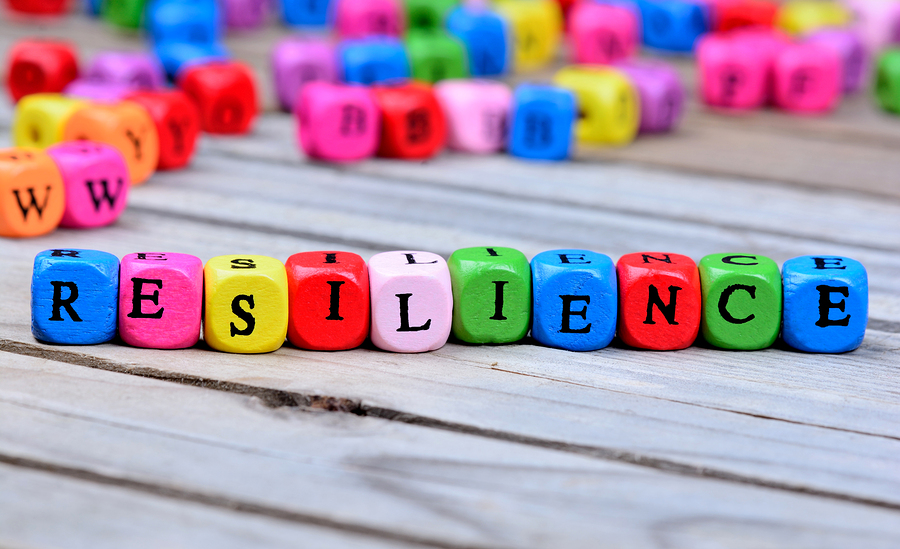Increase Your Resilience
Most of us are surrounded by more stress than ever before. It often starts the minute we get up as our devices feed us headlines. Our jobs require instant and continued results, and yesterday’s accomplishments seem to be remembered less and less.
Ama Marston and Stephanie Marston’s new book, Type R: Transformative Resilience for Thriving in a Turbulent World, is a thoughtful and inspirational guide to thriving during stressful times. Type R’s use challenges to innovate and grow.
I recently spoke with Ama Marston about her research into resilience. Ama is an internationally recognized leadership expert who has worked on five continents with global leaders. She is also the founder and CEO of Marston Consulting.
You start your new book with a gripping account of a car accident that impacted your lives. How did this awful accident impact your life’s work and result in this book?
For my mother, the process of having to recover from severe injuries and learn to walk again ultimately shaped her path to becoming a psychotherapist and stress expert. I was three at the time, but the accident also forged an even stronger lifetime bond between the two of us.
Decades later that led us to support one another while each of us separately faced the financial crisis as business owners, the ups and downs of entrepreneurship, family and health crises, etc. Through ongoing conversations we supported one another and also sought to better understand the convergence of personal, professional, and global turbulence. These challenges were something we were facing ourselves, but that we were each seeing in our respective professions. This was occurring in corporations and in the halls of the United Nations. It was on the minds of our clients and colleagues, global leaders, and our friends and family. So, while it took decades for the impacts of our car accident to come full circle, in some respect it planted a seed for a lifetime of learning about Transformative Resilience together and ultimately collaborating and writing Type R.
Reframe Adversity
Adversity is a terrible thing to waste. It should be reframed. Stress has advantages. Failure can be good. All of these ideas are advanced in your book, and many would shake their heads and say, “There’s no way this can be good!” Why is it important to reframe adversity in this way?
Adversity in its many forms is often a catalyst for the next iteration of ourselves, our leadership, our businesses, our communities, or even the way in which we approach public or global challenges.
We will face adversity at some point in our lives, if not multiple points, whether that’s in our personal lives, at work, in our organizations or leadership roles. And we will certainly be impacted by and required to participate in discovering solutions for national and global challenges as we face trends like increasing economic inequality and super-storms linked to climate change. This makes the ability to reframe adversity and use it to grow, innovate, and be better prepared for the future the essential skill and the key to success in our turbulent world.
Researchers at the Harvard Business School also point out that we learn more from failures and mishaps than successes, and when things go well we are more inclined to analyze them and draw out lessons that allow us to learn, grow and adapt.
What is Type R? What are some of the characteristics of a Type R?
Type Rs are the resilient individuals, leaders, businesses, families, and communities that turn challenges into opportunities in times of upheaval, crisis, and change. Type Rs use adversity to ignite their strengths with the knowledge that they have the resources necessary to meet the challenges we face. And they look for opportunities that might be a by-product of their setbacks or stressful and painful experiences.
“The growth at the heart of this is enabled by the Type R core belief that wherever we are in our lives we always have the ability to learn more, become more capable, adapt to our circumstances, and grow in the face of challenge. This holds true for individuals, leaders, organizations, and even whole families.”
This Type R mindset and the six supporting Type R skills or key behaviors apply across a range of contexts whether talking about someone facing a major career change, a family illness, or a leader analyzing and navigating Brexit or other global disruptive changes or challenges. These skills include: Adaptability,
Healthy relationship to control, Continual learning, Sense of purpose, Leveraging support, and Active engagement.
Develop Resilience
Can we develop into a Type R?
Type R isn’t a ‘you have it or you don’t’ skillset. We may not have all of the Type R skills at the same time or in equal measure, but they can be developed and strengthened over time. It’s a continuum, and regardless of where individuals or groups of people fall on the continuum, they can always increase their abilities, often as a result of specific events or mounting pressures that precipitate change.
In our book we also look at six stages that people or even organizations and communities go through in a process of transforming challenges into opportunities. This starts with being comfortable in the status quo and then being thrown into chaos by disruptive change. Type Rs then go through a process of acceptance, experimentation, and ultimately creating a “new normal” as they integrate lessons and skills garnered from difficulties into the leaders, businesses, or even communities that they become.
Become a Type R Leader
Talk a little about the Type R leader. How do you recognize one immediately?
 For decades, we have been taught that leaders look like a narrow group of people with a fixed skill set: presence, gravitas, command, and control. And yet, we are increasingly coming to understand the need for diverse leaders and a range of more facilitative, nuanced kinds of leadership to address today’s business needs and global challenges.
For decades, we have been taught that leaders look like a narrow group of people with a fixed skill set: presence, gravitas, command, and control. And yet, we are increasingly coming to understand the need for diverse leaders and a range of more facilitative, nuanced kinds of leadership to address today’s business needs and global challenges.
This means that Type R leaders, like others, will show up in different ways. Unless they have their Type R cape or cuff links on, it may take a little time to recognize them. That said, a clear hallmark of Type R leaders is an ability to reframe adversity—to look at it in different ways and find opportunity in it while also acknowledging losses, disappointment, stress and real-world complexities.
Type R leaders believe in the transformative nature of challenges; they have the confidence built by facing adversity, the capacity to be comfortable with disruption and the discomfort of others. This is combined with a larger vision of the mission and purpose of their work. And it often comes with the awareness that as they build their skills as Type R leaders, they create a ripple effect. They transform the face of leadership, organizations, and businesses and may bring new skills and innovative thinking to the increasing number of global challenges that impact us all.
“Growth stems from a mindset that says, ‘We have been through hardship before and, should it occur again, we will be able to make it through, learn from it, and better ourselves.’ This makes us more effective as visionaries, managers, and strategists.”
“By using adversity in our lives to promote growth, we both consciously and unconsciously influence the actions of a significant number of people. Each of us creates a point of impact that makes waves that ripple outward through our various spheres of influence.”
How can organizations develop some of the same type R characteristics?
Identifying the collective mindset or existing culture of a group or organization is the starting point for any change. Do we focus on our limitations and collectively catastrophize when faced with challenges, or do we focus on the cracks where the light seeps in and invest the belief that we’re able to grow?
 Understanding the differing ways in which people or teams within the organization have been impacted by an event or circumstance also helps to understand root causes of challenges that then allow for a shared process of continual learning, growth, and innovation.
Understanding the differing ways in which people or teams within the organization have been impacted by an event or circumstance also helps to understand root causes of challenges that then allow for a shared process of continual learning, growth, and innovation.
In his research with high pressure yet high reliability organizations like hospitals and fire departments, Tim Vogus at the Owen Business School at Vanderbilt University found that the key to these organization’s resilience was their confidence in their ability to weather challenges—in other words, Type R cultures. It’s important to call upon stories that remind us of times when we have successfully navigated difficulties previously whether as a team, a business, a family or even an entire nation. These stories bolster confidence, but also may provide insights for what worked and may help us find lessons and skills that are transferable to different contexts or circumstances.
Leaders can take an initial Type R assessment at www.type-r-resilience.com
For more information, see Type R: Transformative Resilience for Thriving in a Turbulent World.

